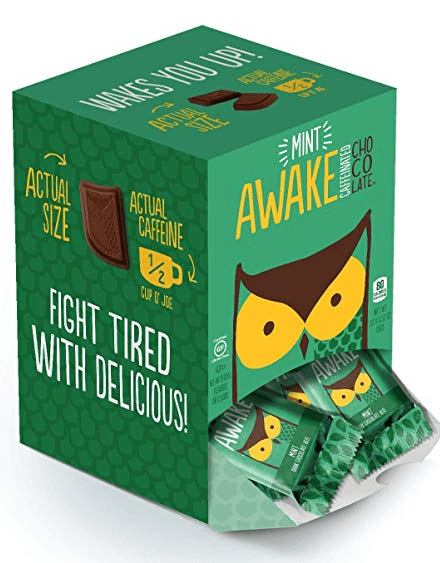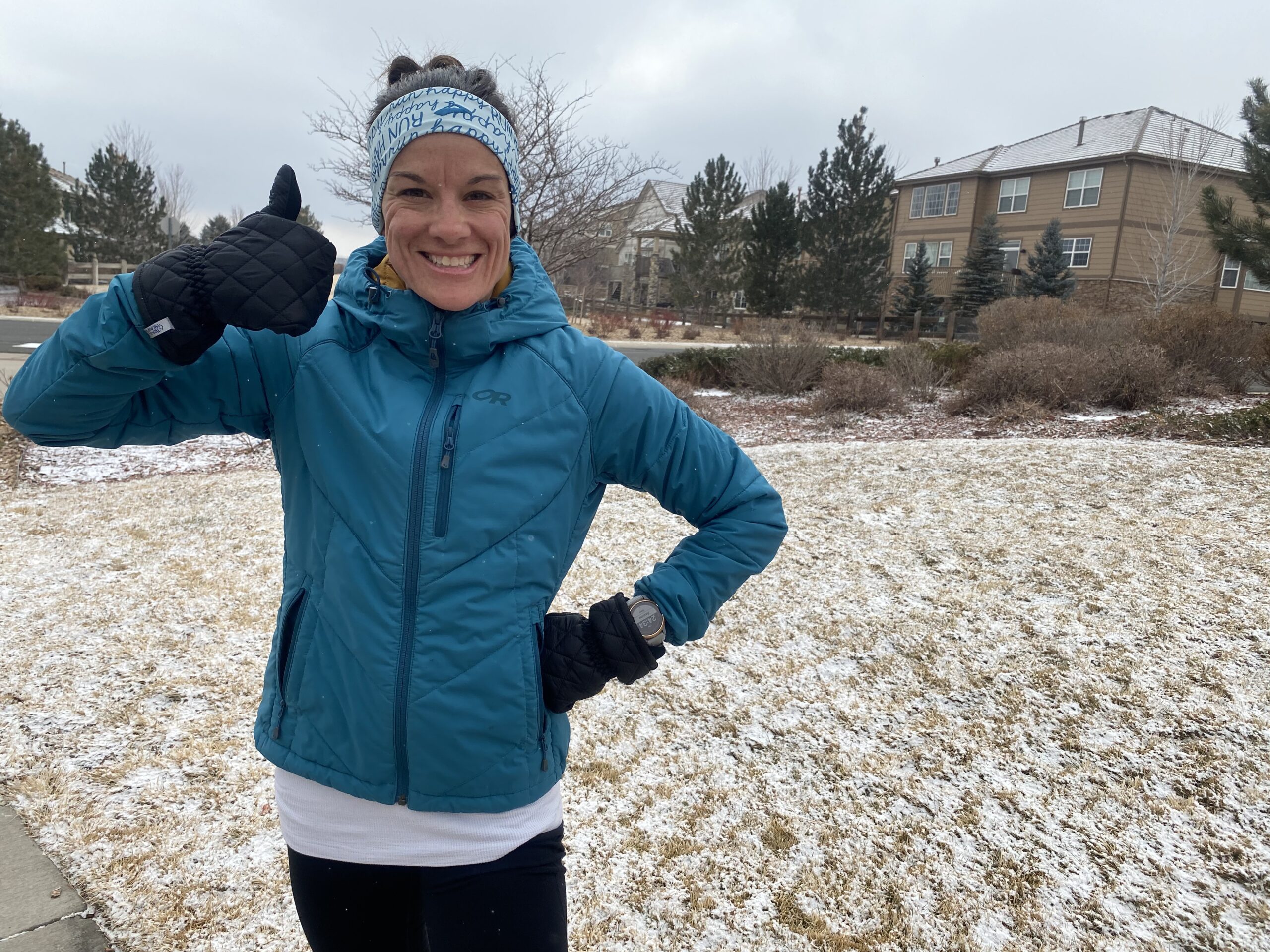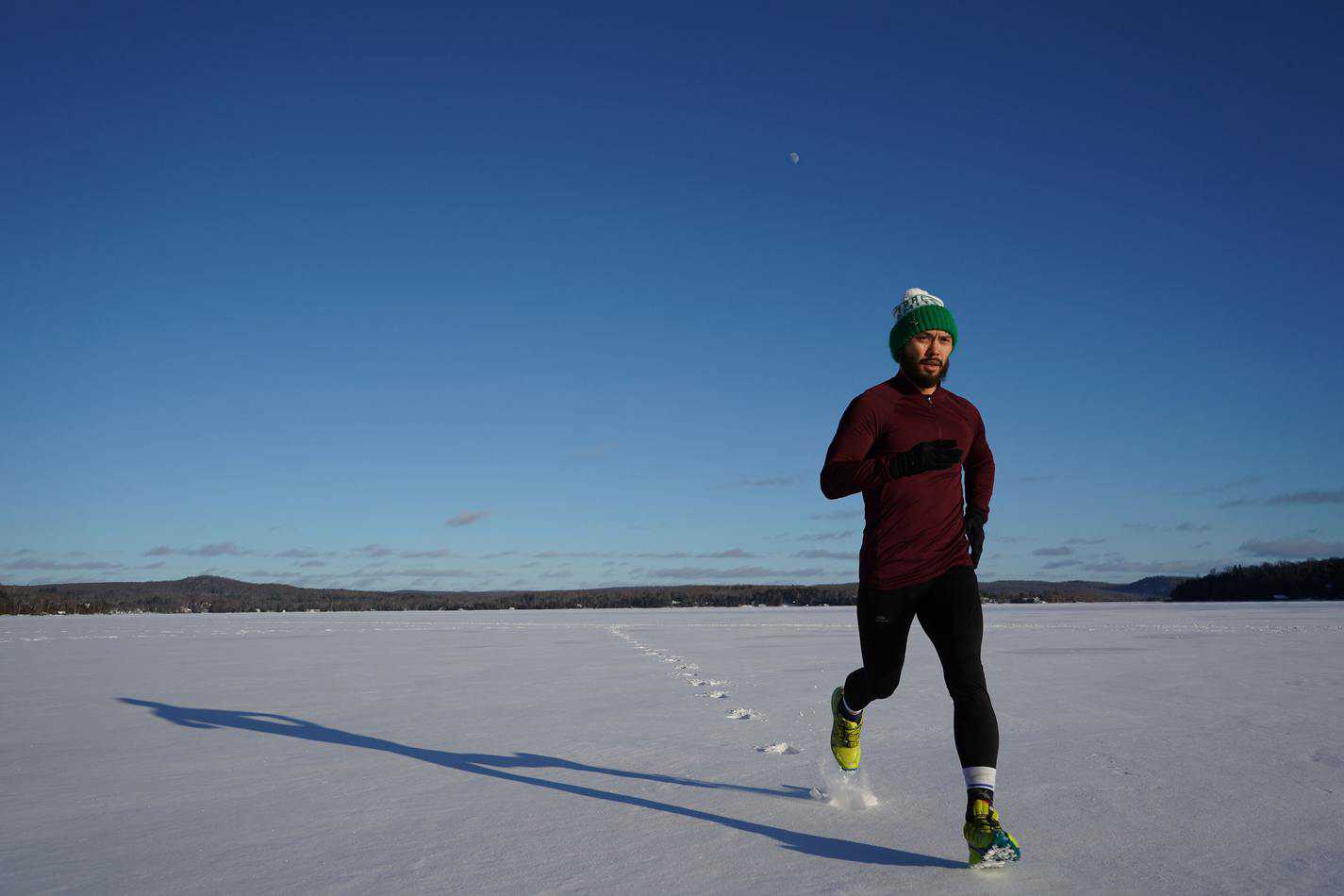Many people start their day with a fresh cup of joe. In fact, coffee is the most widely consumed beverage in the world. And the running community definitely drinks its fair share. Whether I’m running first thing or not, I personally love starting my day with coffee to wake up a bit, but I usually stop at one cup. It got me wondering how caffeine affects a runner’s performance…and just how much coffee a runner should be drinking (if any??) before running.
So, should you drink caffeine, such as coffee, before you go running? There is research to suggest that drinking the equivalent of about 1 – 2 cups of coffee before heading out for a run can increase both speed and endurance with minimal negative side effects. This same dosage can be met through other forms of caffeine such as endurance drinks, gels, caffeine pills, and energy drinks.
Here I’ll focus specifically on how consuming caffeine (often in coffee form) before running will affect you and your performance as well as ways to take in that caffeine if you’re one of those people who just can’t get past the bitter taste.

Caffeine’s Effects in Everyday Life
Before getting into the specifics of how caffeine before running will affect the outcome, let’s take a general look at caffeine’s effect on our bodies. (Because 90% of us already take it regularly in one form or another.)
According to the University Health Service at U of M, caffeine “acts as a stimulant by exerting an effect on the central nervous system.” Most people can feel its effects within about 15 minutes.
Feeling absolutely no symptoms from the use of caffeine is rare, though how it makes people feel can vary. It also depends on how much caffeine is consumed.
According to the Mayo Clinic, it’s healthy to consume up to 400 milligrams of caffeine per day (even though it is regarded as an addictive substance).
An 8-ounce cup of coffee contains about 95 milligrams of caffeine, making a safe consumption amount about 4 cups per day.
The most common side affects of a normal daily dosage of caffeine include:
- a more alert brain
- increased cognitive function
- better concentration
- an awakened feeling and less drowsiness
- increased energy
- reduced headaches
These feelings are generally considered positive by those who consume caffeine. And keeping daily dosages within the healthy range means it’s unlikely that you’ll feel negative affects (unless you’re drinking coffee within 6 hours of your bedtime…don’t do that!)
However, it’s important to note that caffeine can lead to negative effects such as: increased heart rate, elevated body temperature and blood pressure, jitters, anxiety, irritability, increased thirst, insomnia, and more. If you’re feeling these negative effects, it’s best to consult your doctor. He or she can help you to determine your best next steps and help you gradually decrease your caffeine intake.
U of M expresses that “consuming moderate amounts of caffeine does not seem to have long-term detrimental effects.”
Awake yet? Let’s get into why you’re here and find out how caffeine can affect you on your run.

How Caffeine Before Running Helps with Speed
I think we all wouldn’t mind being a little bit (or a lot bit) faster. After all, setting personal records is extremely motivating! Most of us spend a lot of time figuring out what it is that we can do to get faster whether it be improving our form, including more speed work into our training, eating a healthier diet, etc. Even the littlest tweaks can lead to a big difference. When it comes to our coffee consumption, most of us don’t probably tie it to improving our running speed. But, guess what? It CAN!
This study demonstrated that taking caffeine 1 hour prior to exercise led to 5% faster performance times in endurance athletes. Wondering about shorter distances? They were faster, too. In this study, both well-trained and recreational runners saw about a 1% faster time in their 5k. An obvious link, yes. Earth-shattering results…not really. But, I’ll take what I can get!
These are some of the reasons that runners may run faster after drinking coffee or consuming caffeine:
- improves mental alertness
- gives a decreased perception of effort (making running faster feel easier)
- can make muscles more powerful
- boosts desire for speed
I certainly know I get a jittery feeling from drinking coffee…and I usually want to find a way to unleash it. Out on the pavement can certainly do the trick!
How Caffeine Before Running Helps with Endurance
Now that we’ve established that caffeine does, in fact, make us all a bit faster when we consume it, let’s look into how it might help our endurance (for all of you half and full-marathoners out there!)
Caffeine is said to have enhancing properties for endurance athletes especially. These are a few of the reasons why:
- delays fatigue due to reducing the athlete’s perception of effort
- boosts fat burning
- increased endorphins – leading to that “runner’s high”
So, how do these factors lead to a better long run?
The biggest reason endurance athletes in particular notice the positive effect of caffeine is due to its ability to conserve glycogen while instead using more fat to fuel your running. Glycogen depletion occurs, on average, around the 20-mile mark of a marathon (I talk more about that in my article “What is the hardest mile of a marathon?”). This is what makes those last 6.2 miles so grueling! The better prepared your body is to burn fat as fuel, the better the last fourth of your marathon will go. This study agrees that dietary factors reducing muscle glycogen degradation are good for endurance athletes…so that would include caffeine.
If you’ve ever hit the wall, then you KNOW how debilitating this can be in a race. Nutrition matters a lot when it comes to avoiding this (as well as teaching your body to run past the point of depletion…hello 20+ mile long training runs.) Looking into a caffeinated fuel source to consume during your long run or marathon (like the Tailwind I talk about below) would be a great way to get through these tough miles.
Caffeine: When and How Much to Take
What’s the right amount of caffeine to take before running without going overboard, but still reaping the benefits?
According to Training Peaks, the maximum effect on enhanced athletic performance occurs with about 5-6 milligrams per kilogram of body weight. For a 120-pound runner this would be roughly 270-320 milligrams of caffeine (more than 2 cups of coffee). If you’re thinking, but there’s no way I’d drink that much coffee, don’t worry.
The minimum amount needed to get speed and endurance benefits is about 2 milligrams per kilogram of body weight which would be less than 1.5 cups of coffee for a 120-pound runner (and still less than 2 cups for an 185-pound runner).
So, should you drink this much every time you run? Habitually drinking this much caffeine lessens the effect it has on athletic performance over time. If you increase your caffeine intake sharply (such as going from none to 200 milligrams) you will probably notice the effects within 10 minutes and the positive gains you see during your run will be obvious.
But as this consumption continues, your runs will go back to how they used to be – probably within the first week or so. As a regular coffee drinker, the positive effects that make you faster or run longer decrease with the same daily dosage. Which is why many runners like to do what’s called a “caffeine taper.” With a caffeine taper, you would gradually cease your caffeine consumption about 2 weeks out and then eliminate caffeine altogether about 1 week out from your race. But be forewarned, you will likely experience headaches or other withdrawal symptoms in those first several days as you reduce your caffeine.
Worth the extra quickness during your race? That’s up to you. The bright side is that by two weeks out from when you first started cutting caffeine, all of the negative withdrawal symptoms should be long gone.
The Downside to Drinking Coffee Before Running
As great as caffeine can be for your running speed and endurance performance, there can be negative effects. Just as it jumpstarts the parts of your body that help you run, it’s also jumpstarting another urge…to go to the bathroom.
Here’s the potty talk.
If you’re a coffee drinker, chances are you’re quite familiar with its ability to get your morning bowels moving. And I’d say many runners, myself included, need their morning coffee not just to wake up and have a better run, but also to get your first poop of the day accomplished before your head out the door.
But is it a myth that coffee helps you poop? Nope, not at all. In fact, this article from Healthline reports that coffee makes the colon 60% more active than water.
What I did learn, however, is that it’s not actually the caffeine in coffee that makes you have to hunt up a bathroom, because decaf coffee has the same triggering effect. So if you take your caffeine in coffee form (as most people do) chances are you’ll need to poop soon.
So is this actually a negative?
Staying regular is a great thing. Unless you’re in the middle of a run. Consuming coffee immediately before you head out the door can backfire. In order to make sure this doesn’t end up being you, I’d say give yourself at least an hour before heading out the door. That gives you time to drink your coffee while your body then works its magic.
I think I speak for all runners when I say there’s nothing quite like the feeling of accomplishing a good poo before you start your run.
Next up, is dehydration a concern?
As a diuretic, or something that increases urine production, some have wondered if the combination of caffeine consumption and running can lead to dehydration.
This is false. Moderate daily caffeine consumption by way of coffee (less than 240 milligrams per day – about 2 cups of coffee) actually contributes to daily hydration and acts similarly to a cup of water.
Whether you drink a bunch of coffee or you drink a bunch of water, you’re going to have to pee. So should you consider this before you run? Of course. You don’t want to have to stop and pee the whole time. But if you drink your coffee ahead of time, and use the bathroom before you leave you should be just fine. And though I don’t recommend skipping the water by any means, you don’t have to worry about your normal dose of caffeine causing dehydration.
Coffee Substitutes to Get Caffeine
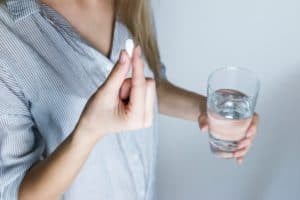
Coffee is certainly an acquired taste and not everyone wants to drink it. (Who are you people, though?! Just kidding…) But not to worry! Non-coffee drinking runners can still get the positive running effects of caffeine without drinking coffee. Here are some of the best options for caffeine if you want to skip the morning brew.
Caffeinated “running fuel”:
Tailwind Nutrition is a popular drink consumed by endurance athletes. I drink something similar, Sword Nutrition, and they both offer non-caffeinated and caffeinated versions. I’ve personally never tried the caffeinated options, but I’m definitely considering it after the research linked to endurance performance. I definitely feel like I’m dragging sometimes toward the end of those long runs!
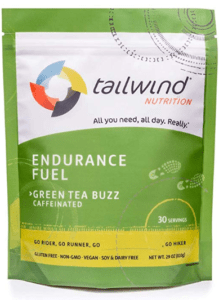
Caffeinated Tailwind comes in the following flavor options:
- Raspberry Buzz
- Colorado Cola
- Greet Tea Buzz
- Tropical Buzz
Each scoop contains 35 mg of caffeine. So significantly less than a cup of coffee, but good for maintaining that boost as you sip on it throughout your run.
More of a gel person? Clif Shot Gels can be used throughout a long run (10 miles or more) and contain 50 mg of caffeine per gel. Taking one about every 5 miles is a good rule of thumb, though it’s important to figure out what works best for you. Definitely take the time to practice your long run nutrition.
Caffeine pills:
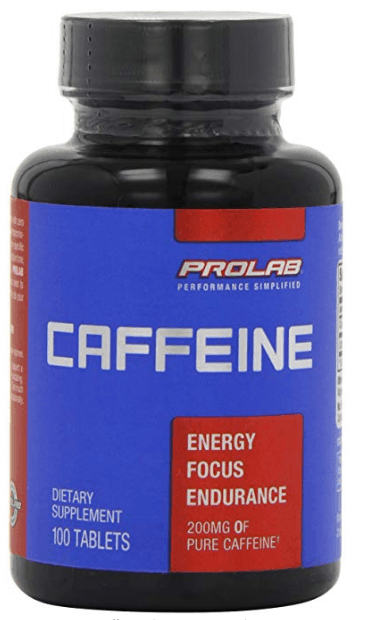
My first thought about caffeine pills (which means it’s something you’re likely wondering, too) is, but are they safe? I think the word “pill” just automatically sends off red alerts. But actually, caffeine pills have to be FDA approved and are considered safe. Medical News Today states, “Caffeine pills are safe for most people in moderation, and if they limit their intake of additional sources of caffeine.” As stated above, caffeine intake should be kept below 400 milligrams – so anyone combining caffeine pills with other caffeine sources should take extra care.
These ones by ProLab offer 200 mg per tablet. Of course, if that’s too much for you, each tab can easily be cut.
Caffeinated Chocolate:
Well, I don’t know about you, but this one is definitely I could get on board with. I’m even considering forgoing coffee just to try this! (Nah, I’d do both!)
There are different brands available, but I like that this one comes in small squares. Easy to grab a couple before your run for that little extra boost of energy. Each square equates to a half a cup of coffee (50 mg caffeine).
They offer various flavors including:
- Milk Chocolate
- Dark Chocolate
- Caramel
- Dark Chocolate Mint (Yum…my fave)
- Peanut Butter
Energy drinks and soda are other offerings that contain a decent amount of caffeine. I would recommend steering clear of these before running, however, as they usually have a lot of sugar or sugar substitutes. Not a good pre-run choice.
Energy Drinks
You might be wondering if an energy drink such as Red Bull is a good choice to drink before a run.
One can of Red Bull has 111 mg of caffeine, so a bit more than an 8-ounce cup of coffee. It will definitely give you that energy boost you’re looking for as you head out the door for your run.
The thing you’ll want to be mindful of, however, is the sugar content. One can has 37 whopping grams of sugar! That can be a lot to ingest before a run. This would be something I would recommend using sparingly or using only before races or long runs if you know it works well in giving you that speed or endurance boost you need.
Summarizing the Effects of Caffeine Before Running
- Consuming caffeine in normal daily dosages of less than 400 milligrams per day is perfectly safe (less than 4 cups of coffee).
- Taking caffeine before running can increase your speed and endurance (the positive effects are small, but they are there.)
- Taking in nutrition during your run in the form of a caffeinated drink or gel can delay the fatigue you often see after glycogen is depleted (around mile 18-20)
- Caffeine loses its effects over time, however. If you want to see a particular increase in speed or endurance at a particular race, consider a “caffeine taper” where you slowly reduce and then stop consumption 1-2 weeks out.

